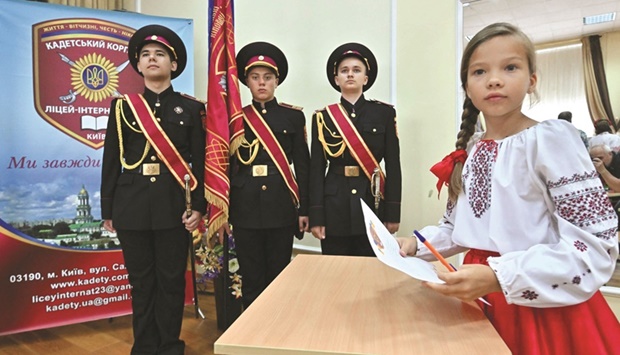Ukraine yesterday said it had restarted operations at its blockaded Black Sea ports as it moved closer to resuming grain exports with the opening of a co-ordination centre to oversee a UN-backed deal.
Progress towards fulfilling the landmark agreement came as Kyiv’s artillery struck a key bridge in Moscow-controlled territory in south Ukraine, damaging an important supply route as Ukrainian forces look to wrest back the Kherson region.
German authorities said Russia’s state energy giant Gazprom drastically cut gas deliveries to Europe via the Nord Stream pipeline to about 20% of capacity in a move decried in the EU as revenge for Western sanctions over the invasion.
Ukraine and Russia last week agreed a plan with the help of Turkey and the United Nations to allow grain stranded by Moscow’s naval blockade to be exported from three ports.
Kyiv has said it hopes to begin sending out the first of millions of tonnes of grain “this week” despite a missile strike by Russia over the weekend on the port in Odessa.
Ukraine’s navy said “work has resumed” at the export hubs to prepare for ships to be escorted through the mine-infested waters to reach world markets.
As part of the deal, a co-ordination centre involving Ukrainian and Russian representatives opened in Istanbul to monitor the safe passage for shipping along established routes and oversee inspections for banned weapons.
The blockage of deliveries from two of the world’s biggest grain exporters has contributed to a spike in prices that has made food imports prohibitively expensive for some of the world’s poorest countries.
Fighting has continued to rage on the ground in Ukraine despite the push to get the grain out, and Kyiv struck back by hitting the vital Antonivskiy bridge over the Dnipro river in a move that threatens to cut supply lines to Russian troops.
Ukraine’s Defence Ministry said on Twitter the strikes on bridges over the Dnipro created an “impossible dilemma” for Russia: “retreat or be annihilated by the Ukrainian army”.
Kirill Stremousov, the deputy head of the Russian-installed regional administration in Kherson, confirmed the bridge had been hit overnight and traffic had been halted.
But he sought to downplay the damage, insisting that the attack would not affect the outcome of the hostilities “in any way”.
Ukrainian forces in recent weeks have been clawing back territory in the Kherson region, which fell to Russian forces easily and early after their invasion launched on February 24.
Their counter-offensive, supported by Western-supplied long-range artillery, has seen its forces push closer to Kherson city, which had a pre-war population of under 300,000 people.
Russian forces “should leave Kherson while it is still possible. There may not be a third warning,” Ukrainian presidential adviser Mykhaylo Podolyak said on Twitter after the attack.
Meanwhile the leader of pro-Russian separatists in eastern Ukraine called on Moscow to conquer key cities across the country. “Today the time has come to liberate Russian cities, founded by Russians: Kyiv, Chernigiv, Poltava, Odessa, Dnipro, Kharkiv, Zaporizhzhia, Lutsk,” Denis Pushilin said on Telegram.

A cadet from Volodymyr the Great military school writes a letter to Ukrainian soldiers in Kyiv yesterday. The cadets wrote u201cVictory Lettersu201d to Ukrainian soldiers fighting with Russian troops and announced the start of an all-Ukrainian crowdfunding for the purchase of US F-16 fighter jets for the Ukrainian Air Force. (AFP)
